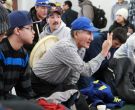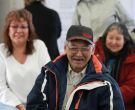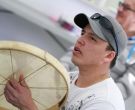In addition to the rules set out in the Final Self-Government Agreement (FSGA), the Deline Got’ine Government (DGG) will have its own Constitution. The Constitution describes principles that the Deline Got’ine Government must follow.
The Constitution describes:
- The guiding principles of the Constitution
- The principles of government
- Deline Got’ine laws
- The structure of the DGG
- Who is a Citizen
- Official languages
- The accountability of the DGG
- How the Constitution and FSGA can be amended
Here are some highlights.
Preamble of the Constitution
The beginning of the Constitution describes principles that guide the rest of the document.
- We are the Sahtuto’ine, the descendants of Eht’se Aya.
- We honour Great Bear Lake.
- We live in harmony with the lands, waters and animals.
- We respect the wisdom of the Prophet, our ancestors and our elders.
- We respect our traditional knowledge.
- We respect our language.
- We have negotiated to establish a unified government at the community level.
Principles of government
Deline will be governed as one people by the Deline Got’ine Government.
The Government will:
- Respect the Sahtu Land Claim Agreement.
- Observe openness and transparency.
- Respect our traditions and culture.
- Collaborate with other Aboriginal people, our neighbours, non-Aboriginal residents and other governments.
As a government, the DGG must:
- Act with respect, fairness and without discrimination,
- Consult with all Deline citizens on important decisions,
- Encourage free expression and participation of all Deline citizens,
- Act to protect lands, waters and resources and all living things.
Deline Got’ine laws
The FSGA describes powers and responsibilities of the DGG. The FSGA is protected as a Treaty and gives the DGG the authority to pass certain laws. All DGG laws must fit with the Canadian Charter of Rights and Freedoms. The DGG laws must follow the FSGA.
The structure of the Deline Got’ine Government
The Deline Got’ine Government will include:
- The Ekwatide (Chief)
- The Deline K’aowedo Ke (Council)
- Deline ʔǫhda K’aowe Ke (Elders Council)
- Deline K’a Dats’eredi Ke (Justice Council)
- Beneficiaries Board (Land Claim Board)
- Deline Lenats’ehde Dzene (Community Gathering)
Ekwatide (Chief)
The Ekwatide will serve a 4-year term and will be chosen by Deline First Nation Citizens. The Ekwatide must be a Deline First Nation Citizen and a resident of Deline. There will also be a minimum age limit.
Deline K’aowedo Ke (Council)
The K’aowedo Ke will be made up of 8-12 members, who will each serve a 4-year term. It will be made up of the Ekwatide, an Elders representative and members at large.
The K’aowedo Ke runs the Government and passes laws.
Deline ʔǫhda K’aowe Ke (Elders Council)
The ʔǫhda K’aowe Ke will be made up of all Deline Elders. It gives advice to Council and appoints a representative to Council.
Deline K’a Dats’eredi Ke (Justice Council)
The K’a Dats’eredi Ke will be made up of 3-5 members, who each serve a 4-year term.
It will be an independent body that will handle dispute resolution, violations of DGG law and appeals from DGG decisions.
Beneficiaries Board
The Beneficiaries Board will be made up of 3-5 members, who each serve a 4-year term. It will be elected by resident and non-resident land claim beneficiaries.
The Beneficiaries Board manages land claim monies and lands, and gives direction to Council on land claim matters.
Deline Lenats’ehde Dzene (Community Gathering)
The Lenats’ehde Dzene will meet at least once a year. It will be made up of all Deline First Nation Citizens and all residents of the Deline District. It will receive reports from the DGG, including reports on land claim matters.
Deline First Nation Citizens
All members of the Deline First Nation (DFN) Band and all members of the Deline Land Corporation will be Deline First Nation Citizens. A person who is a citizen under another self-government agreement is not eligible to be a DFN citizen.
Duties of Citizens
All DFN Citizens have a duty to:
- Work together, to seek consensus and harmony.
- Help each other and respect one another.
- Help the community.
- Respect our Elders and leaders, and support the youth.
- Live in harmony and protect the land, the environment, the waters, the animals and plant life.
Official languages
The official languages of the DGG will be North Slavey and English. All persons may communicate with the DGG in either language.
Accountability
The DGG is accountable to Deline First Nation Citizens and to residents of the Deline District.
The DGG must give annual reports to the Deline Lenats’ehde Dzene (Community Gathering) about its work and the administration of the land claim.
Amendments
Amendment of Deline Got’ine ʔeɂadó (Constitution)
Any amendments to the Constitution will be done by secret ballot. For an amendment to pass, it must have the support of at least 60% of the people who vote, and at least 25% of Deline First Nation Citizens have to vote.
Amendment of FSGA
Amendments to the Final Self-Government Agreement (FSGA) will be done by secret ballot. For an amendment to pass, it must have the support of at least 60% of the people who vote, and at least 25% of Deline First Nation Citizens have to vote.
Minor amendments to the FSGA can be approved by Deline K’aowedo Ke (Council) provided the amendment has been discussed with the Deline Lenats’ehde Dzene (Community Gathering).




